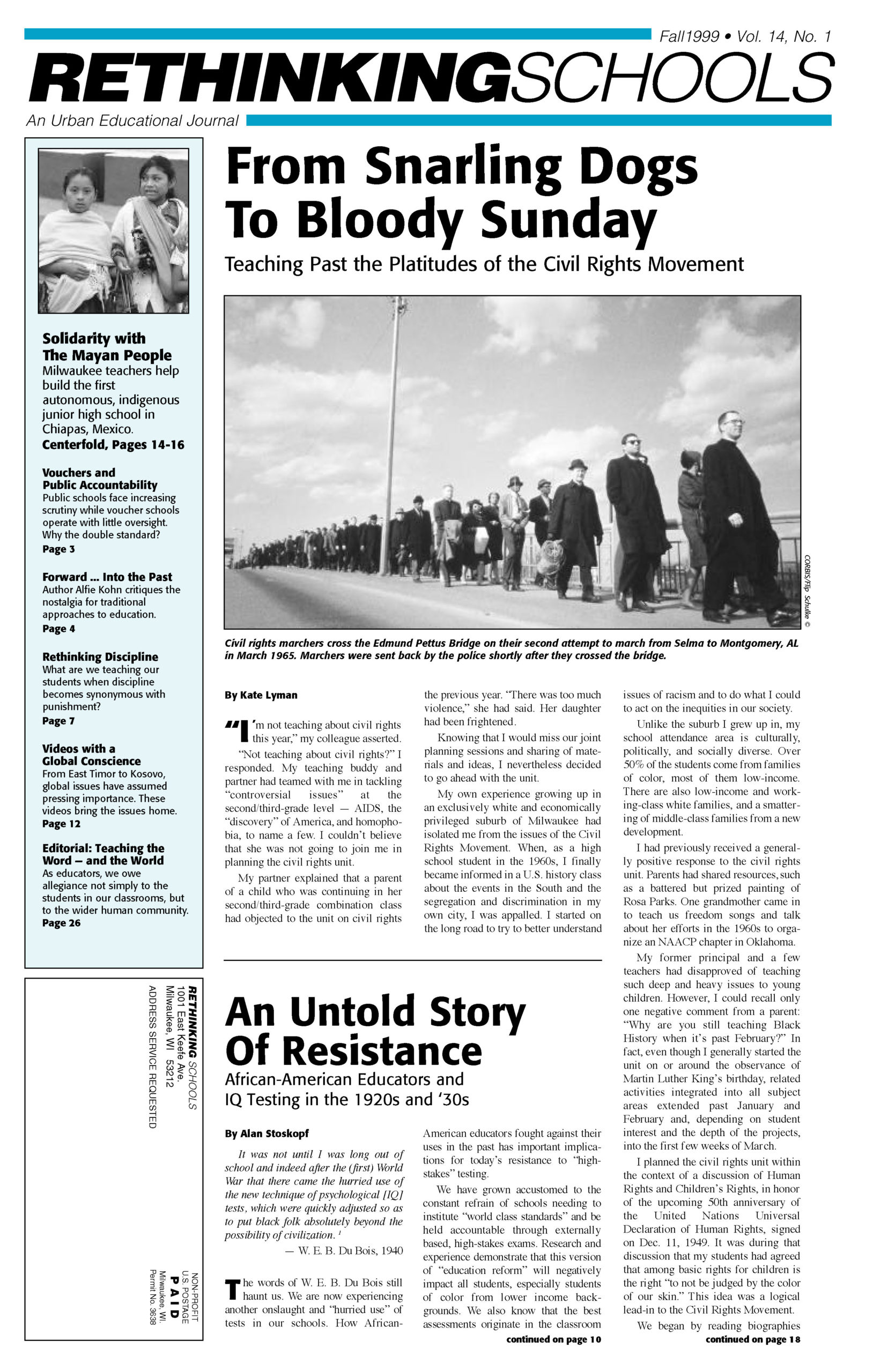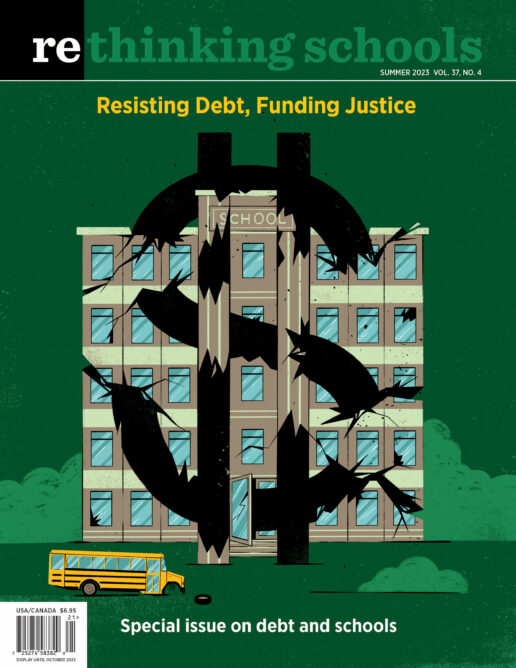-

From Snarling Dogs to Bloody Sundays
Teaching Past the Platitudes of the Civil Rights Movement
An elementary school teacher describes how she tries to teach past the platitudes of the Civil Rights Movement.
-
Children Who Made a Difference
Details about some of the children and events mentioned in Kate Lyman’s article, “From Snarling Dogs to Bloody Sunday.”
-
Selected Resources
Books about the civil rights movement recommended for students in grades 2 through 8.
-

An Untold Story of Resistance
African-American Educators and IQ Testing in the 1920's and '30's
African-American educators fought back against IQ testing in the 1920s and 1930s. Their struggle has important implications for today’s resistance to high-stakes testing.
-

Vouchers and Public Accountability
Public schools face increasing scrutiny while private voucher schools are allowed to operate with almost no oversight. Why the double standard?
Public schools face increasing scrutiny while private voucher schools are allowed to operate with almost no oversight. Why the double standard?
-
Why the Secrecy?
The Milwaukee Archdiocese refuses to release information about voucher schools.
-
Problems Erupt in Cleveland
Concerns over safety hazards, unlicensed teachers, and reliance on video for instruction.
Voucher schools chalk up concerns over safety hazards, unlicensed teachers, and reliance on videos for instruction.
-
Forward…Into the Past
Traditional approaches to teaching are back in vogue. Get ready for a return to memorization and recapitulation of accepted facts – and don’t forget to keep those desks in straight rows.
-
No’ Is the Right Answer
A high school student explains why she refused to take her state-mandated Massachusetts Comprehensive Assessment Test
A high school student explains why she refused to take the state-mandated standardized test.
-
Rethinking Discipline
What are we teaching our students when discipline policies are reduced to punitive measures grounded in coercion, control, and compliance?
What are we teaching our students when discipline policies are reduced to punitive measures grounded in coercion, control, and compliance?
-
Moving Beyond Tired
For many teachers, a video is far more appealing on a Friday night than a pot luck meeting. What keeps teacher activists going?
For many teachers, the thought of a video is far more appealing on a Friday night than the idea of going to a potluck meeting. What keeps teacher activists going?
-
Networking, Organizing, and Resisting
Portland-area teachers' group takes on issues ranging from standardized tests to teaching about globalization
The story of the Portland Area Rethinking Schools group, which is taking on issues ranging from standardized tests to teaching about globalization.
-
Teaching the Word—And the World
Editorial As educators, we owe allegiance not simply to the students in our classrooms, but to the wider human community and to the earth itself.
-
East Timor
The most recent eruption of crisis in the small Asian nation of East Timor presented teachers with an all-too-familiar challenge. Suddenly the news was filled with horrific images of death […]
-
Edison Loses Millions – Again
Edison Schools Inc., which ultimately will live or die at the hands of Wall Street, not the school boards of America, is not faring well financially.
The for-profit education company loses almost $50 million this year, as Wall Street commentators question its plans to issue public stock.
-
We Object to These Tests
Parents explain why they think the standardized tests in Massachusetts do more harm than good
Parents tell why they believe the Massachusetts test does more harm than good.
-
Tips for New Groups
Ten suggestions for getting a new teacher group off on the right foot.
-
California Lawsuit Notes Unequal Access to AP Courses
The State of California is denying its low-income and minority students equal access to education by depriving them of the Advanced Placement (AP) classes available in more affluent, suburban high schools, according to a recent lawsuit.
Low-income and minority students in the Los Angeles area have fewer chances than their affluent, suburban counterparts to take Advanced Placement courses.
-
AP Disparity in The Milwaukee Area
A look at unequal representation in AP courses in Milwaukee.
-

Introduction: Zapatista Movement
On Jan. 1, 1994, the world learned of the Zapatisa movement when an army of 12,000 Zapatistas seized control of towns and municipalities throughout the state of Chiapas in southern […]
-
Our Struggle is…
Statements that form the heart of the Zapatista Movement
-
An Education that Turns Night into Morning
Excerpts from a letter by the Education Committee of Oventic, Chiapas, requesting international support for efforts to establish the first indigenous junior high school run by the Zapatista movement.
-
Putting Muscle into the Meaning of Solidarity
activists supporting indigenous schools in Chiapas work with their hands as well as their heads.
-
Resources on Chiapas
Organizations, Web sites, and books that can tell you more.
-
Our Communities Are Very Poor…
An interview with a retired Mexico City teacher who now works with the schools created by the Zapatistas.
-
Videos with a Global Conscience
From East Timor to sweatshops, global issues have assumed pressing importance. These videos can bring the issues home to U.S. classrooms
From East Timor to Kosovo, from sweatshops to environmental degradation, global issues have assumed pressing importance. These videos bring the issues home to U.S. classrooms.

Volume 14, No.1
Fall 1999
Annual Subscription: $24.95
Purchase Digital Copy: $4.95
To purchase individual paper copies of the magazine email us or call customer service at 1-800-669-4192




